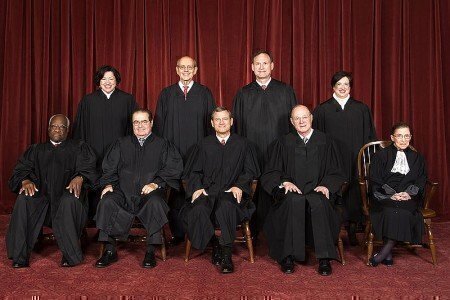It’s not exactly March Madness, but the Supreme Court has some big decisions in its pipeline that could be coming down in the next few weeks, including a case with international implications and an important ruling on a Facebook case.
 Last year, the Justices surprised by some observers by sitting on two cases in March 2014 that had been argued in October 2013: McCutcheon v. Federal Election Commission and Schuette v. Coalition to Defend Affirmative Action.
Last year, the Justices surprised by some observers by sitting on two cases in March 2014 that had been argued in October 2013: McCutcheon v. Federal Election Commission and Schuette v. Coalition to Defend Affirmative Action.
The McCutcheon decision eventually came down on April 2, 2014, and it overturned limits on aggregate federal campaign contributions. Three weeks later, the Schuette decision held that bans on affirmative action programs were permissible through a state amendment. Both decisions were among the biggest cases decided in the 2013 term at the Court.
By this time in March 2013, the Court had already decided two high-profile cases from the 2012 term. On February 19, 2013, the Justices ruled in Florida v. Harris and on February 26, the Court decided Clapper v. Amnesty International.
In the Harris case, the Court considered if police officers could search a motor vehicle for drugs once a properly trained police dog “alerted” to a smell on a vehicle. Justice Elena Kagan wrote in a unanimous opinion that police could use the dog in a vehicle search in a public area.
In Clapper v. Amnesty International, the Court considered if the respondents, including journalists, had standing under Article III of the Constitution to challenge the Foreign Intelligence Surveillance Act (or FISA). The Court agreed with the federal government’s claims that the respondents’ fears were based on speculation. But the Court didn’t rule on the constitutionality of FISA.
Later in March 2013, the Court decided another major case: Florida v. Jardines. In that decision, Justice Antonin Scalia wrote the majority opinion in a 5-4 decision, which ruled against the use of a police dog to sniff out drugs at a residence as a Fourth Amendment violation.
So as we roll into March 2015 here is a look at four significant cases in the front of the Supreme Court pipeline.
Zivotofsky v. Perry (argued Nov. 3, 2014). This case involves 12-year-old Menachem Binyamin Zivotofsky. Menachem’s parents are American citizens, and Menachem was born in Jerusalem.
Citing a 2002 law passed by Congress and signed by President George W. Bush, with reservations, the Zivotofskys asked the State Department for a passport for Menachem when he was two-months-old that listed “Jerusalem, Israel,” as his birthplace. The State Department refused to add the word “Israel” to Menachem’s passport, and the dispute has been in the legal system since them.
The direct constitutional issue is Zivotofsky is the question of which branch of government controls all, or at least most, of the foreign policy decisions in Washington.
The direct political issue is the current United States foreign policy of it not recognizing Jerusalem as part of Israel. A Court ruling that would favor Congress could be interpreted overseas as a de facto American recognition of Israel’s claim to Jerusalem, which would have major policy consequences.
Elonis vs. United States (Dec. 1, 2014) is a case originating near Bethlehem, Pennsylvania. Anthony Elonis is challenging a 44-month prison sentence for posts on Facebook that appeared to threaten his wife with violence, including statements made by Elonis online after he was served with a protection-from-abuse order.
Elonis believes that the lower court that convicted him should have been presented with direct evidence proving that Elonis made the statements with the intention of harming their recipients. Elonis claimed he made the statements as therapeutic works of art, in the form of rap lyrics, and he never intended to harm anyone.
The decision in the case could have a lot to say about the First Amendment in the age of Facebook.
Alabama Legislative Black Caucus v. Alabama (Nov. 12, 2014) is about gerrymandering.
After the 2010 Census, Republicans took control of the Alabama state legislature and passed a new legislative map. The new map maintained the same number of “majority-minority” districts in the state Senate and even added one such district in the House.
However, in order to narrow the population differences between districts as well as to maintain the same percentage of minority voters in majority-minority districts, Republicans moved a large number of African-American voters out of majority-white districts and into those with minority majorities.
Young v. United Parcel Service (argued Dec. 3, 2014) is a case that could affect women who are working and pregnant, and may want job conditions changed based on their pregnancy.
Peggy Young worked as a delivery driver for the United Parcel Service (or UPS). During her pregnancy, Young’s doctors told her to not lift more than 20 pounds while working. UPS’s employee policy, however, required employees to be able to lift up to 70 pounds.
Young wasn’t able to fulfill the 70-pound-lifting work requirement, and she had used all her available family and medical leave, which forced her to take an unpaid leave of absence. She also lost her medical coverage during the leave. Young gave birth in April 2007 and she resumed working at UPS thereafter. Young then sued UPS and claimed she had been the victim of gender- and disability-based discrimination under the Americans with Disabilities Act and the Pregnancy Discrimination Act of 1978.
UPS has modified its policy, but the case is still at the Court. The stakes are still significant, since many other companies don’t draw the distinction that UPS now does about pregnancy, disability and work conditions.






